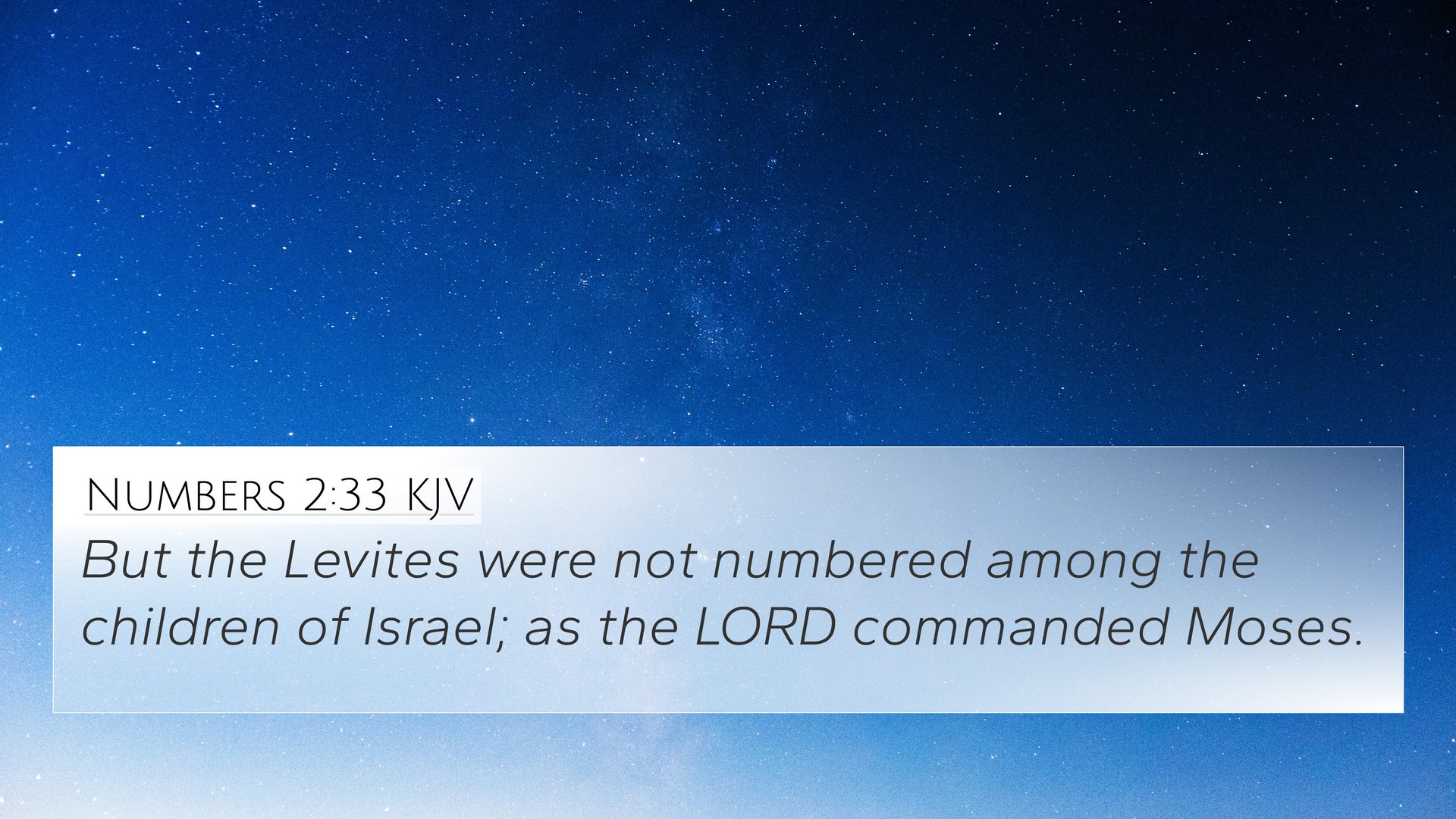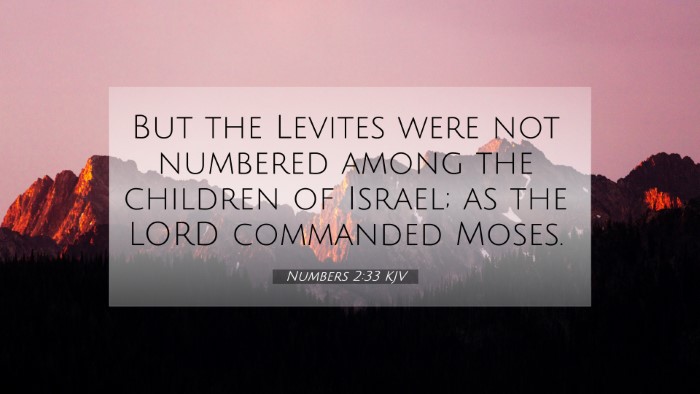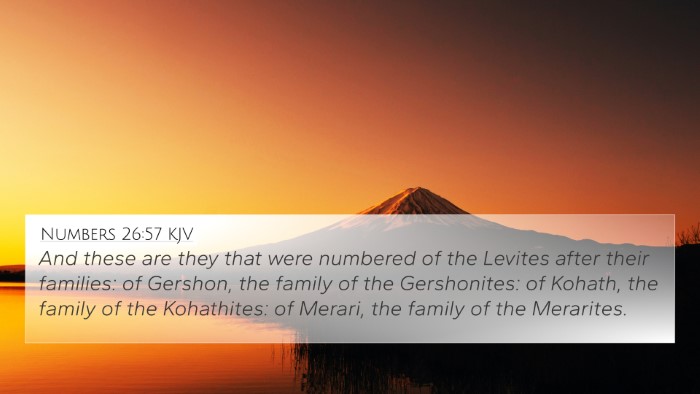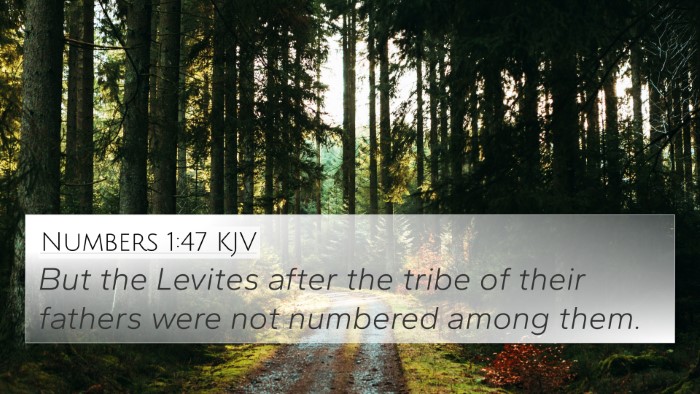Understanding Numbers 2:33
Numbers 2:33 states, "But the Levites were not numbered among the children of Israel; as the LORD commanded Moses." This verse highlights the unique role of the Levites within the Israelite community as not being counted in the military census alongside the other tribes. Instead, they were designated for service in the Tabernacle and the sacred duties associated with it.
Contextual Background
The book of Numbers provides significant insight into the organization of the Israelite camp and the roles assigned to each tribe. The Levites, descendants of Levi, were set apart to assist the priests in their religious duties, reflecting their special status before God.
Commentary Insights
- Matthew Henry: He emphasizes the special designation of the Levites, pointing out that their lack of inclusion in the military census indicates their sacred responsibility. Henry notes that their role was divinely appointed, separating them for the service of the sanctuary.
- Albert Barnes: Barnes remarks on the significance of the Levites' exclusion in relation to their duties. Their role in the tabernacle worship illustrates that they are not to engage in warfare but rather focus entirely on spiritual matters.
- Adam Clarke: According to Clarke, this separation of the Levites signifies God's intention that they would serve as mediators between Him and the people. Their role is crucial in maintaining the holy practices that draw Israel closer to God.
Bible Verse Cross-References
To further understand Numbers 2:33, we can connect it with several other scripture passages that provide context and thematic insights:
- Exodus 28:1: God appoints Aaron and his sons to serve as priests, highlighting the importance of the Levitical line in worship.
- Leviticus 1:5: Details the role of the priests in offering sacrifices, underscoring the Levites' supportive role in worship.
- Deuteronomy 10:8: Affirms the Levites' separation for the Ark of the Covenant, emphasizing their unique calling.
- 1 Chronicles 23:28-32: Discusses the responsibilities of the Levites in the temple service post-exile, linking past duties with future worship.
- Hebrews 7:14: Connects Christ's lineage to Judah, illustrating the shift from the Levitical priesthood to the everlasting priesthood in Christ.
- Revelation 20:6: Mentions the role of priesthood regarding the saints, a theme sensitive to the Levites' original service of intercession.
- Acts 6:5: Indicates the early church appointing deacons to minister, reflecting the continuance of service roles similar to the Levites.
Thematic Bible Verse Connections
The exclusion of the Levites from census numbers correlates thematically with several concepts seen throughout the Bible:
- Separation for Service: The Levites' call represents a broader biblical theme of individuals or groups set apart for God’s specific purposes.
- Divine Order: The organization of the Israelite tribes reflects God’s divine order, revealing how He structures His people for worship and community.
- Worship vs. Warfare: Their non-involvement in battle illustrates a distinction between worshipful service and military duty, revealing balanced roles within the community.
How to Use Bible Cross-References
Utilizing cross-references through tools like a Bible concordance or Bible cross-reference guide helps readers delve deeper into the connection between scriptures. Here are some methods to enhance your study:
- Identify Themes: Look for recurring themes across different scriptures that link back to Numbers 2:33, such as the emphasis on holy service.
- Explore Parallel Accounts: Compare this verse with parallel accounts in the Gospels or later New Testament writings to understand continuity in God's plan.
- Utilize Cross-Referencing Tools: Implement tools like the Bible cross-reference system during study to find relevant verses that engage with your primary verse.
- Contextual Study: Develop a greater understanding of the context in which these cross-references were written, enriching your grasp of the scriptures.
Conclusion
Through a careful examination of Numbers 2:33 and its broader literary and theological contexts, we see the vital role of the Levites in God’s plan for Israel. By studying the connections between this verse and others, believers can appreciate the depth of God’s call for holiness and service. The practice of cross-referencing Biblical texts not only enhances understanding but also encourages a deeper relationship with the Word of God.




